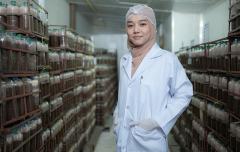Finance commitments under Energy Compacts reach $1.6 trillion with $284 billion already mobilized towards achieving global goals on clean energy
Annual report shows growing impact, but trillions more needed to deliver universal energy access and meet climate targets
New York, 25 September 2025 - New commitments to boost renewable energy and increase access to electricity and clean cooking technologies by 2030 have brought the finance and investment pledged through the United Nations to US$ 1.6 trillion, with $284 billion already mobilized, according to the fourth edition of the Energy Compacts Annual Progress Report being released today.
The report, which is being launched at the EnergyNow SDG7 Action Forum on the margins of the UN General Assembly, shows expanding action under the Energy Compact voluntary commitments on both energy access and transition. Of the $284 billion mobilized or deployed since 2021 through the Compacts, the majority has been private sector investment in renewable power generation. The report cites figures from the 2025 Tracking SDG7 Report that over $4 trillion total investment is needed annually to reduce the ranks of 660 million people living without electricity and over 2 billion still cooking with polluting fuels, while setting the world on a climate action trajectory towards net-zero emissions by 2050 and averting ever-worsening climate impacts.
"The world is entering a decisive moment for energy," noted the leadership of UN-Energy -- Haoliang Xu, Acting Administrator of UNDP and Co-Chair of UN-Energy; Damilola Ogunbiyi, the Special Representative of the UN Secretary-General for Sustainable Energy for All and Co-Chair of UN-Energy; and Li Junhua, Under-Secretary-General of the UN Department of Economic and Social Affairs, which serves as the Secretariat for UN-Energy.
"Choices made today will determine not only whether we achieve our climate and development goals, but also how future generations experience prosperity, equity, and security," the three UN-Energy leaders added. "The Energy Compacts are proving that transformation is possible [...], that solutions to advance the global energy transition are no longer abstract -- they are investment-ready and being scaled, adapted, and delivered."
Expanding results on energy transition and access
Progress on achieving affordable and clean energy for all -- Sustainable Development Goal (SDG) 7 -- has been moving forward, but not at the scale and pace needed to meet the deadline of the 2030 Agenda or the climate targets under the Paris Agreement. The Energy Compacts progress report outlines commitments from governments and the private sector, which include planned spending by countries for both domestic and international action to increase energy access, efficiency and renewables, as well as private sector investment slated in these areas. Since the Energy Compacts were launched in 2021-- in connection with the UN High-level Dialogue on Energy -- 209 commitments have been registered and substantial results generated, according to the report.
By providing new and improved electricity connections, Energy Compact proponents have enhanced electricity access for 285 million people, a significant increase of 108 million people in the past year. Progress on enhancing clean cooking access by Energy Compact proponents remains slower, with 33 million people added since 2021, up from 23 million last year. The latest Tracking SDG7 Report showed that population growth in Sub-Saharan Africa continues to outpace access gains, leaving approximately 14 million additional people without clean cooking solutions every year.
Updated figures also show how Energy Compacts have had positive impacts on a wide range of SDG goals, such as improving electricity access at over 10,400 health facilities (SDG3), and by helping to deploy over 2.8 million electric vehicles and over 336,000 charging stations (SDG11).
The report includes guidance on how national governments, regions and cities, private companies, financial institutions, UN agencies and civil society organizations can submit their own Energy Compact commitments through an online process.
The report notes that, as countries roll out their updated national climate commitments under the Paris Agreement, incorporating energy targets through national Energy Compacts can serve as an important tool, citing Indonesia and Nepal as examples. Case studies in the report highlight the diversity of Energy Compacts, ranging from a woman-led, solar-powered digital community centre in Guatemala to a Japanese business that enables customers to track the source of their electricity, as needed to work towards 24/7 carbon-free energy.
The report was prepared by UN-Energy, the coordination mechanism which includes nearly 30 UN and international organizations that work on energy issues, with data compiled and analysed by Sustainable Energy for All (SEforALL).
Media contacts:
UN-Energy Secretariat, United Nations Department of Economic and Social Affairs (UN DESA): Pragati Pascale, pascale@un.org
United Nations Department of Global Communications: Martina Donlon, donlon@un.org
Sustainable Energy for All (SEforALL): Sakshi Chandra, sakshi.chandra@seforall.org
